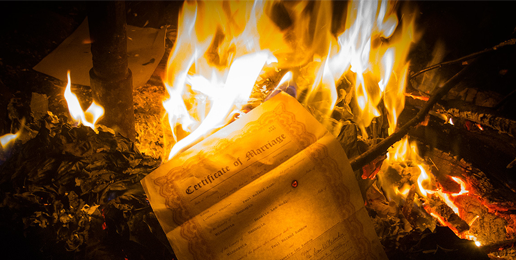
“I also think… that it is a no-brainer that the institution of marriage should not exist.”
~ lesbian activist Masha Gessen
Let’s try a little thought experiment. Let’s imagine that now, after legally recognizing intrinsically non-marital same-sex unions as “marriages,” we notice that there remains a unique type of relationship that is identified by the following features: it is composed of two people of major age who are not closely related by blood, are of opposite sexes, and engage in the only kind of sexual act that is naturally procreative. We decide that as language-users there must be a term to identify this particular, commonplace, and cross-cultural type of relationship. Let’s call it “huwelijk.”
In this thought experiment in which the term “marriage” would denote the union of two people of the same sex and “huwelijk” would denote the union of two people of opposite sexes—both of which provide the same legal protections, benefits, and obligations—does anyone believe that homosexuals would accept such a distinction?
I suspect that homosexuals would not accept such a linguistic distinction. They would not accept it even if they enjoyed all the practical benefits society historically accorded to sexually complementary couples and even if their unions were legally recognized as marriages.
Homosexuals would not tolerate such a legal distinction because their tyrannical quest for universal approval of homoerotic relationships cannot be achieved unless they obliterate all distinctions—including linguistic distinctions—between homosexual unions and heterosexual unions. Homosexuals—whose unions are naturally sterile—would not tolerate any term that signifies the naturally procreative union between one man and one woman.
In the novel 1984, George Orwell named the process in which homosexuals (as well as the “trans” cult) regularly engage: Newspeak. Here is how Orwell explained Newspeak:
Newspeak was the official language of Oceania, and had been devised to meet the ideological needs of IngSoc, or English Socialism….
The purpose of Newspeak was not only to provide a medium of expression for the world-view and mental habits proper to the devotees of IngSoc, but to make all other modes of thought impossible. It was intended that when Newspeak had been adopted once and for all… a heretical thought… should be literally unthinkable, at least so far as thought is dependent on words. Its vocabulary was so constructed as to give exact and often very subtle expression to every meaning that a Party member could properly wish to express, while excluding all other meaning and also the possibility of arriving at them by indirect methods. This was done partly by the invention of new words, but chiefly by eliminating undesirable words and stripping such words as remained of unorthodox meanings, and so far as possible of all secondary meaning whatever….
[T]he special function of certain Newspeak words… was not so much to express meanings as to destroy them….
[W]ords which had once borne a heretical meaning were sometimes retained for the sake of convenience, but only with the undesirable meanings purged out of them. (emphasis added)
Homosexuals and their allies seek to redefine words in the service of their ideology and would surely oppose any word that would signal a distinction between heterosexual unions and homosexual unions. A new term that pointed to the reality that homosexual and heterosexual unions are not identical would carry the risk that positive connotations would accrete to the term “huwelijk.”
It’s remarkable that so many are willing to destroy the institution of marriage without ever giving much reasoned thought to whether marriage has a nature (i.e., an ontology) or to what public purposes it serves. G.K. Chesterton warned against this kind of blind willingness to destroy an institution (and the jettisoning of the central feature of marriage—sexual complementarity—does, indeed, constitute the destruction of the institution of marriage):
There exists in such a case a certain institution or law; let us say for the sake of simplicity, a fence or gate erected across a road. The more modern type of reformer goes gaily up to it and says, “I don’t see the use of this; let us clear it away.” To which the more intelligent type of reformer will do well to answer: “If you don’t see the use of it, I certainly won’t let you clear it away. Go away and think. Then, when you can come back and tell me that you do see the use of it, I may allow you to destroy it.” This paradox rests on the most elementary common sense. The gate or fence did not grow there. It was not set up by somnambulists who built it in their sleep. It is highly improbable that it was put there by escaped lunatics who were for some reason loose in the street. Some person had some reason for thinking it would be a good thing for somebody. And until we know what the reason was, we really cannot judge whether the reason was reasonable. It is extremely probable that we have overlooked some whole aspect of the question, if something set up by human beings like ourselves seems to be entirely meaningless and mysterious. There are reformers who get over this difficulty by assuming that all their fathers were fools; but if that be so, we can only say that folly appears to be a hereditary disease. But the truth is that nobody has any business to destroy a social institution until he has really seen it as an historical institution.
In the desperate quest to rationalize their redefinition of marriage, homosexuals asserted that the marriage of any particular homosexual couple will have no effect on the marriage of any particular heterosexual couple. But that’s a silly non-argument. If Bob and Jim were to marry, their marriage would not affect mine. But if Bob were to marry his brother, it wouldn’t affect my marriage either. If Bob were to marry five women or five people of assorted sexes, it wouldn’t affect my marriage. If Bob were to marry five children of assorted sexes, it wouldn’t affect my marriage. Does the absence of effect on my marriage in these cases provide justification for legalizing incestuous, polygamous, polyamorous, or “intergenerational” marriages?
Eventually the redefinition of marriage will affect children, public education, the public’s conception of marriage, the public’s investment in marriage, and the future health of America. Severing marriage from both biological sex and reproductive potential renders marriage irrelevant as a public institution.
The most salient aspects of marriage as an institution sanctioned by the government are not subjective feelings of affection and sexual attraction. The government has no vested interest in the private subjective feelings of marriage partners. That’s why even arranged marriages are legal.
The government has a vested interest in the public good. What serves the public good is the welfare of future generations. And what best serves future generations is providing for the needs and protecting the rights of children, which includes their right to be raised by a mother and father, preferably their own biological parents.
If marriage were solely a private institution concerned only with emotional attachments and sexual desire, as homosexuals claim it is, then there would be no reason for the government to be involved. There would be no more justification for government regulation of marriage than there is for government regulation of platonic friendships. And there would be no legitimate reason to prohibit incestuous marriages or plural marriages.
If the claim of homosexuals that marriage has no intrinsic, necessary, and rational connection to the biological sex of partners or to reproductive potential are true, then there remains no rational basis for the belief that marriage has anything to do with romantic or erotic feelings.
Why is marriage any longer conceived of as a romantic and erotic union? If marriage is severed from biological sex and from reproductive potential and if love is love, then why can’t a loving platonic relationship between three BFF’s be recognized as a marriage? Why can’t the platonic relationship between a 40-year-old soccer coach and his 13-year-old soccer star be deemed a marriage? If “progressives” can jettison the single most enduring and cross-cultural feature of marriage—sexual differentiation—then on what basis can they conceptually retain any other feature, including the notion that marriage is a romantic/erotic union? While eroticism may be important to intimate partners, of what relevance is naturally sterile erotic activity to the government’s interest in marriage as now construed?
When Leftists assert that “love is love,” they really mean that the moral status of erotic activity between two men or two women is no different from the moral status of sexual activity between a man and a woman. If the claim that “love is love,” is true, then there is no rational basis for thinking that there exist types of relationships in which eroticism has no legitimate place. If that’s the case, then why isn’t it morally permissible for all types of relationships to include erotic activity? If all loving relationships are identical (i.e., “love is love”), then why can’t all loving relationships include erotic activity? And if love is love, and marriage has no intrinsic nature, then it’s anything. And if it’s anything, it’s nothing.
If, however, there are different forms of love, some of which ought not include erotic activity, how do Leftists determine when love ought not be eroticized?
Marriage is in tatters, but Leftists want those tatters torched. Next up from “progressive” pyros: “eliminating the binary”—of marriage. Polyamorists are on the move. “Progressives” just love the smell of napalm all day long.
Listen to this article read by Laurie:

Download the IFI App!
We now have an IFI mobile app that enables us to deliver great content based on the “Tracks” you choose, including timely legislative alerts, cultural commentaries, upcoming event notifications, links to our podcasts, video reports, and even daily Bible verses to encourage you. This great app is available for Android and iPhones.
Key Features:
- It’s FREE!
- Specific content for serious Christians
- Performs a spiritual assessment
- Sends you daily Scriptures to encourage and equip you
- You determine when and how much content you get
































